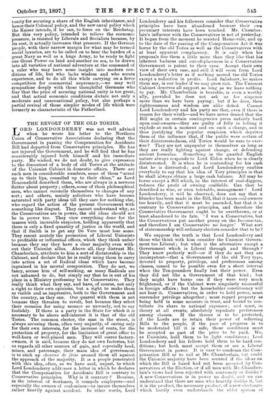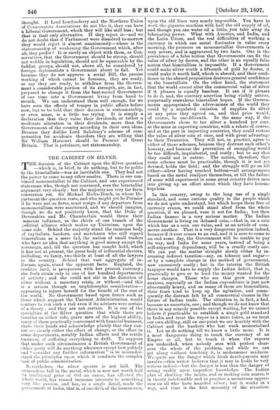THE REVOLT OF THE OLD TORIES.
ORD LONDONDERRY was not well advised when he wrote his letter to the Northern Union of Conservative Associations declaring that the Government in passing the Compensation for Accidents Bill had departed from Conservative principles. He has not injured the Government, and he will find that he has considerably injured both himself and his immediate party. He wished, we do not doubt, to give expression to the discontent of a body of old Tories at the attitude of the Unionist Cabinet in domestic affairs. There are such men in considerable numbers, some of them " acred up to their lips, consolled up to their chins," as Lord Beaconsfield described them, who are always in a nervous flutter about property ; others, some of them philosophical men, who cannot reconcile themselves to changes of any sort ; and others, mainly solicitors who have become saturated with party ideas till they care for nothing else, who regard the action of the present Government with something like disgust. They cannot understand why, as the Conservatives are in power, the old ideas should not be in power too. They view everything done for the masses with incurable suspicion, holding apparently that there is only a fixed quantity of justice in the world, and that if Smith is to get any De Vere must lose some. They resent acutely the promotion of Liberal Unionists to profitable or influential offices, which they think unfair because they say they have a clear majority even with- out their Unionist allies. Above all, they distrust Mr. Chamberlain, attribute to him a sort of dictatorship in the Cabinet, and declare that he is really using them to carry into action a set of Radical ideas which have become ingrained in his mental composition. They do not, we fancy, accuse him of self-seeking, as many Radicals are not ashamed to do, but simply say that he is out of his place in a Ministry professing to be Conservative. They really think what they say, and have, of course, not only a right to their own opinions, but a right to make them as visible and as impressive, both to the Government and the country, as they can. Our quarrel with them is not because they threaten to revolt, but because they select their occasion for using menace so unwisely, not to say foolishly. If there is a party in the State for which it is necessary to be above self-interest it is that of the old Tories. The common elector, the man in the street, is always accusing them, often very unjustly, of caring only for their own interests, for the increase of rents, for the protection of property, for the limitation of great office to well-born or well-placed men. They will coerce factory- owners, it is said, because they do not own factories, but as regards all other sources of gain, and especially land, mines, and patronage, their main idea of government is to stick up chevaux de frise around them all against the approach of the majority. It is a people penetrated with this idea, often, as we have said, unjust, to which Lord Londonderry addresses a letter in which he declares that the Compensation for Accidents Bill is contrary to Conservative principles. Why is it contrary ? Because, in the interest of workmen, it compels employers—and especially the owners of coal-mines—to insure themselves rather heavily against accident. In other words, Lord Londonderry and his followers consider that Conservative principles have been abandoned because their own pecuniary interests have been touched. Mr. Chamber- lain's influence with the Conservatives is not of yesterday. It began from the moment he resisted Home-rule, and up to the date of the passing of the Compensation Act it was borne by the old Tories as well as the Conservatives with at least apparent complacency. It is only when his proposals fine them a little more than they like that his inherent badness and out-of-placeness in a Conservative Government is patent to their eyes. Accept their own view of their own case, and still it will seem from Lord Londonderry's letter as if nothing moved the old Tories except a reduction in profits. Lord Salisbury, be makes them say, is our leader if we may grow rich. The Unionist Cabinet deserves all support so long as we have nothing to pay. Mr. Chamberlain is bearable, is even a worthy ally, provided he does not ask us for sixpence more than we have been paying ; but if he does, then righteousness and wisdom are alike defied. Cannot Lord Londonderry and his party see that, even if there is reason for their wrath—and we have never denied that the Bill might in certain contingencies press unfairly hard upon coal-owners—they are guilty of folly in letting it explode at such a moment and on such a charge, and in thus justifying the popular suspicion which deprives them of the influence that, if the public were certain of their disinterestedness, old Tories would be sure to exer- cise ? They are not unpopular in themselves as long as they are really fighting against change, or defending ancient formulas. Something in the gnarled English nature always responds to Lord Eldon when he is clearly disinterested. It is when he is contending for his cash that he is distrusted; and Lord Londonderry enables everybody to say that his idea of Tory principles is that he shall always obtain a large cash balance. All may be borne except a Bill which, in the interest of coal-diggers, reduces the profit of owning coalfields. Can that be described as wise, or even tolerable, management ? Lord Londonderry, it will be observed, does not say that a blunder has been made in the Bill, that it taxes coal-owners too heavily, and that it must be amended, but that it is contrary to Conservative principles, and therefore the Conservative Government ought to be overthrown, or at least abandoned to its fate. I was a Conservative, but the Conservatives put another penny on the Income-tax, and therefore I am Conservative no longer.' What sort of statesmanship will ordinary electors consider that to be ?
We suppose the truth is that Lord Londonderry and those who think with him consider the Unionist Govern- ment too Liberal ; but what is the alternative except a Government which is Liberal through and through ? They know perfectly well—or if they do not they are incompetent—that a Government of the old Tory type, devoted to property, privilege, and preferences among classes, ceased to be possible even for a abort interval when the Ten-pounders finally lost their power. Even they did not like a. Government of that kind ; but they might have borne one if they were very much frightened, or if the Cabinet were singularly successful in foreign affairs ; but the householder constituency will not bear it. Conservatives, in order to hold power, must surrender privilege altogether ; must regard property as being held in some measure in trust, and bound to con- tribute its share to national expenses ; and must, in theory at all events, absolutely repudiate preferences among classes. If the throne is to be protected, if the Lords are to retain their power of referring Bills to the people, if the pace of progress is to be moderated till it is safe, those conditions must be accepted as part of the price to be paid. We, as Unionists, hold them to be light conditions ; Lord Londonderry and his fellows hold them to be hard con- ditions; but both must accept them or see a Liberal Government in power. It is easy to condemn the Com- pensation Bill or to rail at Mr. Chamberlain, but could the Unionist majority have been secured if the ideas on which the Bill is based had not been accepted by Con- servatives at the Election, or if all men with Mr. Chamber- lain's views had been rejected with contumely or dislike ? A new Conservatism is in power no doubt, and we can understand that there are men who heartily dislike it, but it is the product, the necessary product, of a new electorate which hardly even understands the older system of thought. If Lord Londonderry and the Northern 'Union of Conservative Associations do not like it, they can have a Liberal Government, which they will like still less ; but that is their only alternative. If they reject it—and we do not doubt that if Parliament were dissolved to-morrow they would reject it almost unanimously—where is the statesmanship of weakening the Government which, after all, they prefer ? It is surely an object with them, as Con- servatives, that the Government should be strong, should not wobble in legislation, should not be squeezable by the faddist groups, should not above all, be considered by foreign diplomatists a Government about to fall. Yet because they do not approve a social Bill, the precise working of which cannot be foreseen, they are ready, or say they are ready, to withdraw from the Govern- ment a considerable portion of its strength, are, in fact, prepared to change it from the best-rooted Government of our time into a Government living from hand to mouth. We can understand them well enough, for we have seen the effects of temper in public affairs before now, but to be told that their decision is statesmanship, or even sense, is a little too trying. It is simply a declaration that they value their dividends, or rather a moderate alteration in their dividends, more than the Government of the country according to their own ideas. Because they dislike Lord Salisbury's scheme of com- pensation for accidents therefore they are willing that Sir William Harcourt should be Premier of Great Britain. That is petulance, not statesmanship.











































 Previous page
Previous page